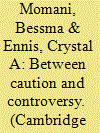| Srl | Item |
| 1 |
ID:
118661


|
|
|
|
|
| Publication |
2012.
|
| Summary/Abstract |
The history of Gulf donorship, its trajectory and underlying motivations, continues to be an understudied aspect of foreign aid. While the Gulf Arab states are not new donors, their manner of regional coordination, branding, and aid management are distinct. Often helping fellow countries of the South, particularly Arab and Muslim countries, these countries have moved towards stronger private sector involvement and into social spending programmes. Owing to their oil wealth, Gulf Arab states' are increasingly generous and yet they are also cautious after 9/11 about how and by whom their aid is channelled. Nevertheless, with oscillations in oil prices, continued controversy over rising Islamism post-Arab-Spring, the future of Gulf aid remains a valuable subject of study.
|
|
|
|
|
|
|
|
|
|
|
|
|
|
|
|
| 2 |
ID:
157710


|
|
|
|
|
| Summary/Abstract |
Foreign aid donors are increasingly focused on changing the way their development agencies function. This discourse has focused on desired qualities, including greater knowledge of local contextual realities, appropriate adaptation to context and greater flexibility to respond to changing circumstances. We argue that more attention needs to be devoted to the achievement of these qualities and turn to contingency theory to identify some under-exploited ways to ‘do development differently’. The qualities sought by donors are emergent properties of complex organisational systems and will only be achieved through a micro-level and interlinked focus on the fundamentals of organisation.
|
|
|
|
|
|
|
|
|
|
|
|
|
|
|
|
| 3 |
ID:
106623


|
|
|
|
|
| Publication |
2011.
|
| Summary/Abstract |
The great aid debate pits those who are radically opposed to foreign aid against those who champion its managerial reform to achieve greater aid effectiveness. This article offers an analysis of the debate by introducing a heuristic distinction between aid 'radicals' and aid 'reformers'. The radical position is notable as it uncharacteristically unites neoliberals and neo-Marxists against foreign aid, while reformers espouse the tenets of managerialism as an ideological and practical vehicle for aid's improvement. Radicals remain sceptical and suspicious of reformist managerial utopias, while aid reformers see little value in radical nihilism. The paper calls for an end to the great aid debate by moving to a discussion of foreign aid that intertwines both radical and reformist perspectives. The 'radical reform' of foreign aid is both desirable and achievable so long as aid is re-theorised as a contested, commonsensical, contingent and civically oriented endeavour.
|
|
|
|
|
|
|
|
|
|
|
|
|
|
|
|